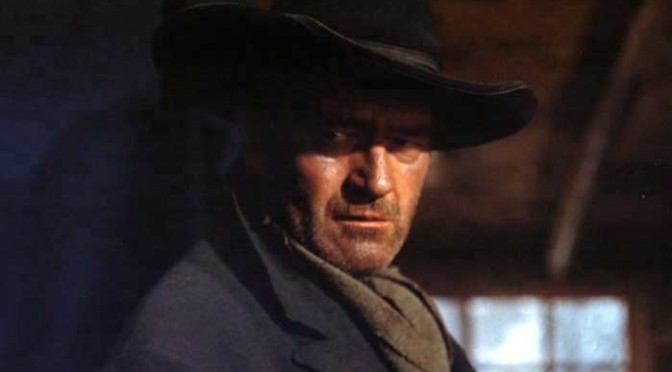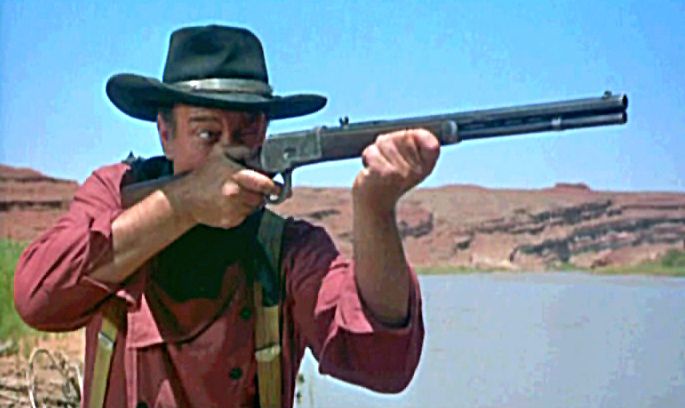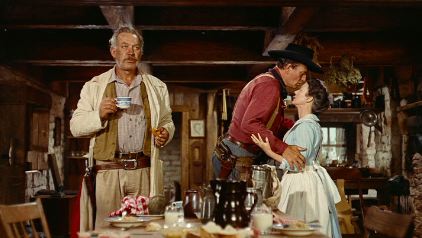After what happened in 2012 it’s unlikely that elections in America will ever again be decided by living US citizens who cast one vote apiece… But just in case I ever get commissioned by the GOP to handle their public image, I came up with a list of some catchy campaign slogans for electable candidates like the Bushes, Boehners, Bob Doles, John McCains and Mitt Romneys who are drafted from the abyss establishment as the antithesis to the Democrat thesis in the ongoing Hegelian political theater in America.
All posts by Captain Gearhead
John Wayne: Textbook Alpha Male?
For those who know who John Wayne was, the typical assumption is probably that the characters he played were alpha males (for those familiar with the term “alpha male” anyway).
Having seen my share of Duke flicks, I can testify that his characters were never pick-up artists (PUAs)–something that seems to go hand-in-hand with alpha behavior. (In fact, it was usually the woman who pursued and approached him–especially in the Howard Hawks movies.) That and a few other personality traits perhaps make a further study of the John Wayne persona worthwhile in the future.
But I used the word “persona” intentionally, rather than mention any specific role he played. Critics of the Duke point out that he wasn’t really an actor, but a movie star. There’s some truth to that, because the characters he played were usually the same guy, just with different names and historic contexts for the different movies.
To over-simplify it for a moment: John Wayne was almost always the hero. I say “almost” because there are a couple exceptions when he was called on to play an antihero.
One of those exceptions occurred when he was curiously cast as Ghengis Khan in The Conqueror. The most interesting exception was the role he played in a John Ford western called The Searchers, and that’s what we’ll look at now.
 The Searchers is a great film for many reasons. One of the most basic of those reasons is the characters it is built around.
The Searchers is a great film for many reasons. One of the most basic of those reasons is the characters it is built around.
The role of Ethan Edwards was a real departure in the screen career of the Duke. Yes, he still exuded toughness, strength and cocksurity, but underneath that was a vengeful, bitter racism that made him the darkest character Wayne ever played.
Unless you watch carefully for details, you’ll miss that Ethan’s
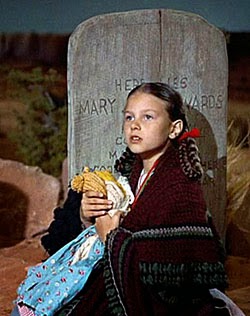
parents were murdered by Commanche. Ethan Edwards is a fanatic. His hatred of the Commanche has caused him to learn their language and customs, and even think the way they do. Ironically, this obsessive racism has made him a perpetual outsider among the white settlers in 1868 Texas.
The clip below reveals a lot about the plot, the characters, and what’s gone on behind the scenes. Watch carefully and take special note of how the hierarchy shines through.
You can spot the alpha dog right away, can’t you? Ward Bond’s swaggering alpha bravado is right at home in…nay, demands to be…the center of attention. He’s a natural leader, and he barks orders at everyone lest they forget who’s in charge. The posse he’s putting together is made up of betas and arguably a couple delta males. Then you can feel the power shift as Ethan Edwards makes his presence known.
Ethan Edwards at this stage of his life is a “sigma male.” He’s the only one in the film the Reverend/Captain Samuel Johnson Clayton (Bond) can’t bully, intimidate, or inspire to follow his leadership. Not only that, but Ethan overrules his authority without hesitation or apology, and turns the impromptu interrogation around on Clayton by questioning his loyalty to the Confederacy.
Exhibit B is Ethan’s sister-in-law Martha. Notice how she caresses Ethan’s coat, and all the unspoken feeling that passes between them when she hands it to Ethan? Important subtext was revealed right there:
Martha married and bore children to stable beta-male provider Aaron Edwards, but her desire is (and always has been) for bad boy Ethan, who left her to go fight in the Civil War.
Female hypergamy hasn’t changed at all since 1868.
Also notice how Sam Clayton witnesses this, but doesn’t find it surprising at all.
Another interesting character is Martin Pawley, played by Jeffrey Hunter. He’s an adopted orphan, in his late teens. He’s an outsider when the story begins. Seems like a beta male, with some alpha tendencies that grow as he matures into a man. (Unfortunately, he fights like a girl.)
Back to Ethan Edwards and the Reverend/Captain Sam Clayton: 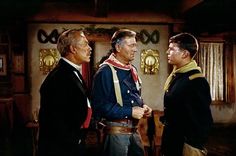 There’s a scene leading into the climax of the film where a young cavalry officer finds Ethan and Martin who have just crashed a wedding (and Martin took back the bride-to-be from his beta rival, Texas Ranger Charlie McRory). The cavalryman is looking for the Captain of the Texas Rangers, and, upon observing those present, he assumes it’s Ethan Edwards until corrected.
There’s a scene leading into the climax of the film where a young cavalry officer finds Ethan and Martin who have just crashed a wedding (and Martin took back the bride-to-be from his beta rival, Texas Ranger Charlie McRory). The cavalryman is looking for the Captain of the Texas Rangers, and, upon observing those present, he assumes it’s Ethan Edwards until corrected.
Something about Ethan just makes people assume he’s in charge. Sam Clayton is miffed about this and takes to humiliating the young lieutenant. Ethan, who is often amused by the drama that goes on between other people (most of whom he regards with barely-hidden contempt), actually joins in on the roast of the young Yankee officer (who is played by Wayne’s son and becomes an increasingly comedic/pathetic character as the film goes on).
There are a lot of reasons to watch The Searchers, re-watch it, and analyze it visually and thematically. One reason is that, half a century before there was a “manosphere” or any discussion of the socio-sexual hierarchy, director John Ford knew how it all plays out in the theater of life.
Alpha Males in Pop Culture
I’m not sure if I’d even heard the term “alpha male” a couple years ago. But enough people have bandied it about in conversation recently that my curiosity was piqued.
Turns out there’s a whole alphabet used to rank men by their personality and status. Not surprising that many disagree on the definitions. This breakdown of the hierarchy might not be the most accurate or popular, but I did find it to be the best articulated.
So in an effort to better understand this classification system, I’m gonna attempt to identify and label some well-known characters from the big and small screen.
The Original Star Wars Trilogy:
Han Solo is an obvious alpha. Loud, bold, overconfident-bordering-on-arrogant and with a big selfish streak. I don’t remember him ever accepting second-fiddle position to anyone. His alpha traits were watered down occasionally for comedic or dramatic effect, so he’s not 100% consistent…but that will probably be true for any fictitious hero.
Chewbacca, being content as Han’s sidekick, might be a beta. But his low SMV (sexual marketplace value) might make him an omega–at least among non-Wookies.
Luke Skywalker looks like the textbook beta. He’s intelligent, competent, with a high SMV, but also comfortable in the sidekick role. After the wars are over and he retires from the Rebel Space Force, he’ll probably settle down in the suburbs behind a white picket laser fence and raise some spoiled brats with a reasonably attractive wife who gazes lustfully at the old holograms of a young Han Solo when Luke isn’t looking. In fact, she was probably one of Han’s conquests, once.
Princess Leia will eventually settle down with a beta provider suitable for her class and status, after breaking up with Han. Han will eventually be caught smuggling Tattooine moonshine and die in prison, or be killed in a bar fight at Mos Isely Space Port.
C3PO may be a droid, but he sure comes off like a delta. I don’t know how to classify R2D2–he’s more like a child or a pet.
Meanwhile, over on the Dark Side of the Force, Darth Vader looks a lot like a sigma, while the Emperor is more like a gamma with latent lambda tendencies.
Shallow Hal:
I bring this up because I couldn’t help picturing the title character when reading Vox Day’s definition of a delta. Jack Black’s role was textbook delta. Textbook.
Famous Detectives:
Achieving clear-cut definitions is tougher than I thought it would be. Still, I’m fairly confident that Mike Hammer is an Alpha. Sam Spade is probably a sigma. And Magnum, P.I. might be a beta who just whines a lot and likes to talk about his feelings.
Classic Westerns:
Generalities are necessary here for the sake of brevity, but I’ll probably go into more depth in the future.
Like most people, my gut instinct is to classify the typical John Wayne screen portrayal as alpha, but this deserves at least one entire blog post of its own, so I’ll leave it at that for now.
Jimmie Stewart see
Clint Eastwood…I’m thinking maybe a sigma. Or maybe just the darker side of the Jimmie Stewart beta?
The villains played by Jack Elam were probably textbook omega, with occasional promotions to gamma.
The “Road” Movies:
I’m referring specifically to the Bob Hope/Bing Crosby comedies all titled “The Road to ______________”.
Bing Crosby’s characters were the obvious alpha of the pair, while Bob Hope invariably played a delta.
Alone and Unafraid
Peter Nealen arrived home from the Sandbox not too long ago and immediately set to work as a novelist. I’ve reviewed his other two Praetorian Security novels. I asked Pete if this was the capper to a trilogy and he said that he envisions this as an ongoing series.
One thing that set his first two efforts apart from the other new military fiction by young veterans (some of which is bloody good stuff) is his commitment to verisimilitude. Told in first person by the paramilitary protagonist Jeff Stone, these books make an admirable effort to immerse you into a grunt’s eye view of the chaos in the near-future Near East.
Jeff’s Private Military Company is like a man trying to navigate a forest fire barefoot. Alliances are constantly shifting. Friends become enemies overnight and vice-versa. Praetorian seems to be only a half-step in front of the Grim Reaper most of the time, in a world with a violent power vacuum in the absence of American interventionism after the collapse of the dollar.
In Alone and Unafraid, Nealen really ramps up the action. Some of the complex regional politics might be challenging to follow early on, but don’t let that deter you, because it takes off soon thereafter. Once it gets going, it just about never stops.
This is my favorite novel in the series so far. Pete has found a nice balance between plausibility and entertainment, and I expect his audience to expand after this.
If you like paramilitary adventure, you need to read this book.
The Arroyo
Critics are people who get paid to spout off their opinions. Often they have college degrees. So you can’t really call me a critic since I don’t get paid to blog here. That distinction might help make sense of my next statement.
If critics hate a movie, I’m often tempted to watch it on the hunch that Hollywood sometimes hides the good ones under a pile of horrible reviews. Looks like critics hate this movie, so you might not have even learned it exists yet.

Let’s start with the “tangible” aspects:
Yes, it is low-budget, and indie. No multi-million-dollar special effects or big name actors. But no cheesey effects, either. The cinematography, sound work and editing were all competent.
The acting is a mixed bag. The major players were good…which is not to say photogenic. None of them will likely ever appear in People Magazine by virtue of their aesthetic appeal. Furthermore, the actor in the starring role has an unfortunate facial disposition which keeps his mouth in the shape of a smile even when he is clearly not smiling; yet his performance was solid.
The supporting actors performed at a level you would expect from friends, relatives and neighbors of an indie filmmaker. The screenwriter compensated for their inadequacies by not asking much of them. So they came off wooden, which is not as bad as grandiose. Underacting is preferable to overacting, I believe. So the supporting players weren’t good, but neither was it painful to watch them.
I saw real potential in the writing and directing. This was a movie with a message, and frankly, more was accomplished in the dialog than what many establishment directors can manage with an elite cast. I found a few clips on Youtube that, for all I know, report the story this film is based on.
The main character is a rancher in a border state. Every day illegal aliens swarm across the border through his property, leaving piles of garbage, vandalizing his fences, stealing from him and, far too often, leaving dead bodies.
The federal government refuses to do its job, and the local government (in the form of the sheriff) turns a blind eye as well. Gunmen for the drug cartels routinely trespass on the rancher’s property and occupy his deer stand. They are using illegals as “mules” to haul controlled substances into the country, and are also raping (or at least coercing sex from) the female illegals, then tying their panties to a “trophy tree.”
When the rancher and a friend decide to chase the cartel off his property, that’s when “shit gets real” in modern hood parlance. The cartel brings in a hit man before long, and he’s about as slimy as they come. Yet he has the best lines in the film.
There is some action, some drama, and plenty of thought provocation Hollywood would never allow. I suspect that last item is the true reason critics hate the movie.
The Blue Max
About a gazillion books have been written, and movies made, about the Second World War. Only a fraction of that have dealt with the FIrst. Of them, this is one of the best.
The protagonist is the antihero Bruno Stachel, who leaves the living hell of the infantry to join the burgeoning German Air Service and make a name for himself. This isn’t just a chance to escape the misery of the trenches, but also the lower caste he was born into (remember Napoleon Bonaparte was a Corsican peasant who managed to get a commission in the artillery because that was a young branch at the time, too).
 But Stachel is a little too eager to distinguish himself. He sets his sights on winning the Blue Max, which requires 20 confirmed kills. His cold, dogged pursuit of this goal is, frankly, similar to that of a hardcorps gamer trying to get the high score/next level on a videogame–only dealing out death to real live human beings, of course, instead of A.I. generated digital targets.
But Stachel is a little too eager to distinguish himself. He sets his sights on winning the Blue Max, which requires 20 confirmed kills. His cold, dogged pursuit of this goal is, frankly, similar to that of a hardcorps gamer trying to get the high score/next level on a videogame–only dealing out death to real live human beings, of course, instead of A.I. generated digital targets.
I have both watched the movie and read the book, and both are well-crafted.
In the movie, the cinematography is pretty and the aerial combat scenes are kick-ass, especially considering they were filmed WAAAAAAAAAAAY before CGI, and most of the Hollywood magic that preceded it.
In the book, Stachel is even more ruthless. Translate that “less sympathetic.” He commits murder at one point to eliminate competition in the form of a fellow pilot who considered him a friend. And he’s an alcoholic on top of everything else.
The ending is strikingly different between the film and the novel, but I’m not going to give either one away. I at least recommend watching the movie. Solid performances are put in by George Peppard (playing well under his age) and Ursula Andress. Personally I appreciated the visual comparisons of trench warfare to air combat. I found all the visuals striking, even before I became attentive to such things in film.
Remembering the Great War

This month is the 100 year anniversary of the “war to end all wars,” retroactively labeled World War One. Nine million died before it was over, and its conclusion almost guaranteed there would be a sequel.
Many, many factors led to the crisis that was sparked by the assassination of Austrian Archduke Franz Ferdinand, A major catalyst was Tsarist Russia’s desire for Constantinople (and warm water ports), owned by their traditional enemy, the Ottoman Empire. Bismark’s intricate cobweb of fragile alliances began to break down once he was no longer around to maintain it. And when the Second Reich’s navy grew close to 2/3rds the size of the Royal Navy, Great Britain became hostile toward Germany and formed an alliance with her traditional enemies, France and Russia. The polyglot empire of Austria-Hungary had very pigheaded, hamfisted leadership in handling the aftermath of the assassination, and unfortunately Kaiser Wilhelm gave them carte blanch to resolve the crisis.

When the Great War began, Field Marshal Helmuth Von Moltke (the Younger–nowhere near the caliber of commander his uncle had been) tampered with the Von Schlieffen Plan at the last minute, weakening the German right wing. Spirited resistance from the Belgians slowed that weakened right wing down, buying the British and French valuable time to deploy their forces. Then tactical Blunders by German commanders, and decisive action by their French counterparts, stalled the German advance short of Paris.
Both sides raced to the sea in an effort to outflank each other, and soon a stalemate ensued that would last for most of the war. Trenches were dug and, though outnumbered, the Germans proved a match for their combined enemies on the Western Front.

Gas warfare was introduced in the trench war, by the Germans…as well as flamethrowers for breaching bunkers. Tanks were introduced by the British. Their invention was mothered by the need for an “armor plated trench-crosser” and the name for the armored monstrosities (“tanks”) came from a disinformation ploy in order to keep the weapon secret.
During the Great War, battle spread even into the sky. Aircraft transitioned from infancy to toddler-hood. What were flimsy, unreliable contraptions in 1914, used primarily for observation, by war’s end had evolved into fighters and bombers.
The reason German strategists violated Belgium’s neutrality had to do with timing, and concern over the alleged heavy hitter in the Triple Entente: Russia. Then, as later, Russia’s manpower gave her a tremendous numerical advantage over any other army in Europe. The German High Command decided they had to deliver a quick, decisive knockout blow in the West so they could turn to meet the “Great Steamroller From the East.” So they banked on the same Von Schlieffen Plan the Prussians used to capture Paris and force France’s surrender in 1871, which meant sweeping through Belgium. As noted above, however, reshuffling of divisions weakened the most crucial component of the Plan in 1914.

Ironically, the knockout blow came in the East. With comparatively small German forces, Hindenburg and Ludendorff humiliated the Russian juggernaut. Austria-Hungary, which touched off this epic powderkeg to begin with, proved worthless militarily. They were barely competent enough to handle Serbia and turncoat Italy (originally part of the Triple Alliance), much less Russia. So the Germans were stuck fighting on both fronts.
 Enter globalist puppet Woodrow Wilson, who saw this epic crisis as an opportunity to bring about a League of Nations–the first overt attempt in modern history to establish world government. After campaigning in 1916 on the slogan “He kept us out of war!” (as if there were any reason to entangle the USA in that European conflict) he stepped up his efforts to get us into war.
Enter globalist puppet Woodrow Wilson, who saw this epic crisis as an opportunity to bring about a League of Nations–the first overt attempt in modern history to establish world government. After campaigning in 1916 on the slogan “He kept us out of war!” (as if there were any reason to entangle the USA in that European conflict) he stepped up his efforts to get us into war.
Armchair historians will be quick to cite the sinking of the Lusitania. The Wilson administration was giving weapons and war material to the British, who were at war with Germany. One shipment was being smuggled over the Atlantic on the famous passenger liner (this has been confirmed repeatedly during the following century, though coincidence theorists still deny it). The Germans posted a warning in American newspapers that nobody should book passage on a ship flying the flag of a warring nation sailing into a war zone.
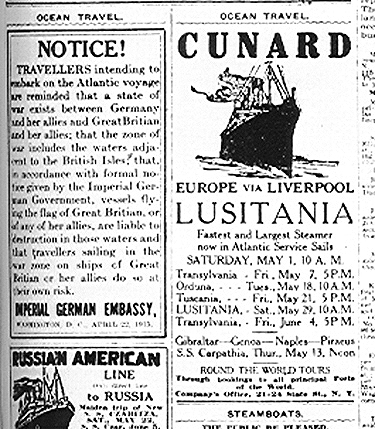 Duh.
Duh.
Were the powers-that-were incredibly foolish, or were they much like the Hamas cowards in Gaza, hiding behind women and children as they fire rockets at Israeli civilians, knowing that any meaningful reprisal will make their enemy look villainous to the world?
Question: would the US Navy have hesitated to sink any vessel from a “neutral” country shipping war material to the Japanese from 1942-45? Absolutely not–that’s back when we fought wars to win.
The Germans did suspend submarine attacks against Wilson’s “neutral” arms trafficking precisely because of the public relations trap. They resumed unrestricted submarine warfare out of national desperation, partly because their population was starving due to the British Navy’s blockade, and they clutched at any straw which might cause the Anglo-French to sue for peace.

After mass desertions in the Russian army and the subsequent Bolshevik Revolution, Russia (the primary instigator of 1914, next to Austria-Hungary) bowed out of the war. This freed up German divisions from the Eastern Front, which shipped West and began to push the French and British back.
But it was too late. By now the USA was overtly involved and fresh American troops were moving up to the lines. Doughboys forced the pendulum to swing the other way.
The Second Reich now realized victory was no longer possible and agreed to an armistice.
The United States Congress was gullible enough to get suckered into World War I, but they weren’t gullible enough to get suckered into the League of Nations.
Wilson, the globalist stooge, had failed.
But the failure was only temporary. The terms of the Versailles Treaty ensured there would be another world war, even worse than the first.
In the aftermath of that war the renewed effort at world government would result in the United Nations. This time Congress would not only entangle America, but arrange so that most of its funding came from the wallets of American taxpayers; most of the cannon fodder for its “police actions” would come from American families; yet the leadership of the world body would always be Communist or Socialist.
Since the formation of the UN–ostensibly created to usher in world peace–there have been more wars around the globe than ever before.
A common fallacy concerning the world wars purports that American “isolationism” made the planet a more dangerous place. Quite the opposite is true. Interventionism paved the way for a sevenfold increase of the horror unleashed on the planet from 1914-18. Had our politicians done what they are hired to do, and genuinely kept us out of that insanity, the Great Powers would have had to sort it out from a more equitable standpoint and it is highly unlikely there would have been a travesty like the Versailles system to turn Germany into a breeding ground for Hitler, or someone like him.
America and Slavery
Back in the Golden Age of videogames there was a weapon gamers were familiar with called a “smart bomb.” When enemy spacecraft began to overwhelm you and your lasers had become an ineffectual asset against the intensity of the attack, you could use the smart bomb you’d been saving, and all the ships on the screen would be simultaneously destroyed.
For the last few decades, in the realm of public debate of a political nature, one side has been resorting to its own smart bomb. When a left-wing collectivist (called “liberal” for PR purposes) finds him or herself being destroyed by the preponderance of evidence and facts presented during debate, they simply accuse racism. All the arguments threatening to overwhelm them are then magically destroyed and they can declare themselves the victor.
 Since 2008 the leftists have been using the race card smart bomb at the beginning of debate to preempt any argument the other side may use. Their opponent hasn’t said or done anything racist, but the accusation is enough to invalidate their arguments in the mind of the average boob tube junkie. Unlike videogames, though, the left has an unlimited supply of these political smart bombs. They’ve used them so frequently and indiscriminantly, however, that the race card smart bomb is not as effective as it used to be.
Since 2008 the leftists have been using the race card smart bomb at the beginning of debate to preempt any argument the other side may use. Their opponent hasn’t said or done anything racist, but the accusation is enough to invalidate their arguments in the mind of the average boob tube junkie. Unlike videogames, though, the left has an unlimited supply of these political smart bombs. They’ve used them so frequently and indiscriminantly, however, that the race card smart bomb is not as effective as it used to be.
The smart bomb is most often used to assassinate the character of individuals.
Of course the left and the mainstream media (forgive my redundancy) employ the race card selectively. If you’re a Democrat, even a history that includes KKK membership won’t hinder a career in the Senate; and the media won’t bother to scrutinize your true colors until the Clintons and Obamas of the world jump on the bandwagon to make excuses for you.

But the race card smart bomb is also used to condemn the United States of America as a whole by those who see the USA as unexceptional, at best.
And it’s no wonder that anti-Americans are so desperate: the truth of history is overwhelming.
There has never been a nation in recorded history to offer such opportunity, where prosperity is so taken for granted that the poor here have more than the upper-income in other countries. Of course that’s changing as the free market is strangled, but there are still a whole lot more people trying to get in than get out. In fact, they are using any and every means conceivable to get in, and at a rate that has exceeded the birth rate of US citizens in the border states.
(You would probably do the same if it meant a life-long free welfare ride for you, free education and medical care for your kids, and all you had to do to earn it is vote Democrat once you are anchored inside unexceptional ol’ America.)
But America is not only unexceptional, it’s evil, they say.
Why? Slavery.
If you find yourself in a conversation that goes down this path, there are some implications you’ll pick up on in the anti-American person’s attitude, if you’re astute. They won’t voice these assumptions out loud, of course, but they’re whispering in the subconscious:
- The USA is the only (or at least the worst) nation to allow enslavement of Africans.
- Slavery of non-Africans throughout history is of no consequence.
- Slavery of Africans is the single-most (if not the only) important phenomenon in world history (at least for the duration of this conversation).
With this stuff going on between the ears, all the facts will be ignored if they can’t be, or haven’t already been, twisted.
America was the most prosperous nation in history? Only because the unexceptional Americans had slaves to do their work for them, you see.
That prosperity hit its peak a century after slavery was abolished? Only because we exploited other downtrodden minorities somewhere or other. The Vietnamese–yeah, that’s it.
Obama swore to uphold the Constitution, then immediately went about destroying i t? Well the agenda justifies the treachery because the Constitution was written by white devils who tolerated slavery, you ignorant flag-waver.
t? Well the agenda justifies the treachery because the Constitution was written by white devils who tolerated slavery, you ignorant flag-waver.
And so on.
Here is some truth about America, Africa, slavery and racism that you rarely ever hear (but might want to remind the next smart-bomber you converse with):
- Slavery is as old as human government. You could call that a longstanding tradition, by the time the colonists in America got around to forming a better union.
- The United States of America did not exist until the late 1700s, though most anti-Americans try to assign the slavery statistics for the centuries before the Revolution to our national guilt. By sheer coincidence I’m sure, they also habitually omit statistics from 1865 to the present.
- Slavery lasted about 80 years in some of the states. How long did slavery last in Britain? In Spain? Portugal? Rome? Egypt?…
- More Africans have emigrated to the USA of their own free will than ever came to this nation on slave ships.
- The grass roots founders wanted to abolish slavery at the very start, but a compromise was made with the slave states of the South because we were at war with the British.
- Another compromise was made in the 1940s to arm, feed, and equip the empire of the worst slavemaster and mass-murderer in the world at that time, because we were at war with the Germans and Japanese. Nobody seems to have a problem with that, though.
- Americans fought, died, killed brothers, cousins and friends to free the slaves in the bloodiest war of our history. This fact is conveniently ignored.
- Slavery is alive and well in the world outside unexceptional ol’ America today, though you probably missed that while being convinced of how awful America is and how much we need to be transformed into the image of other countries.
- Chances are extremely high that you patronize modern slavery without even batting an eye, every time you swipe your debit card at Wal-Mart (and pretty much everywhere else people shop now). Because you want cheap products, and because you vote for policy makers who hate mean ol’ unexceptional America but love her enemies, you buy the exports of the most brutal slave plantation in the world.
Check your hypocrisy.
Marvel Comics Gives Thor a Sex-Change Operation
Maybe you heard the same rumors I did about Marvel replacing the god of thunder with a chick. I decided to check this out, and now that I’m done puking I can report to you that, yes, it’s true.
Some of you who have paid attention to the encroaching agenda by the pied pipers of pop culture are not surprised in the least by this groan-worthy development. Others are wondering just what in the blazes is going on. I’m going to list some possibilities.
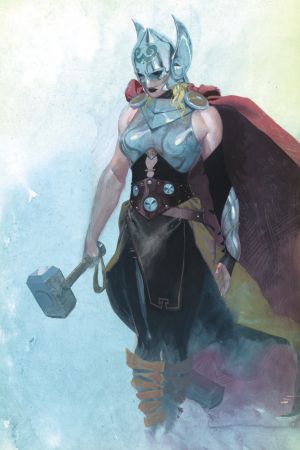
1. Marvel editor Wil Moss and the writers in the bullpen have an overpowering compulsion to foist yet another amazon superninja on their readership, but simply lack the imagination to create an original character.
There’s a lot of evidence of this epidemic throughout the leftist-dominated entertainment industry. Hollywood, for instance, is so bankrupt of creative ideas that they can dream up nothing to make movies about besides old TV shows, video games or toys. (Oh yeah, I forgot other movies).
2. Nobody at Marvel is educated enough to realize that the pantheons of mythology are brimming with goddesses they could build another super-character out of.
Back in the early 1960s Stan Lee plucked Thor from the Norse pantheon to style him as a superhero. As natural an overlap (superheroes and gods of myth) as that is, it was an original idea at the time. But then I established the status of original ideas in # 1 above.
3. The white knights at Marvel know a new superheroine on the comic shelves would go over pretty much like Elektra went over at the box office, so they have to hijack a well-established character to make their ubiquitous feminist tropes even more inescapable.
This is the likliest reason for this knee-jerk “evolution.” Deep down they realize their fantasy femme won’t be able to pull her own weight.
4. Series writer Jason Aaron has trouble getting women to pay him any attention and thinks being able to point to this female-empowering achievement will earn him some dates.
This is assuming he is heterosexual, which might very well not be the case. But homosexuals and feminists share a lot, ideologically, so this could still be part of a desperate ploy to amp up his romantic portfolio.
5. Forced feminization of a strapping Nordic stud is a private fantasy of Aaron, or Moss, or the mistress who has their balls secured in her purse. Giving Thor tits is their encoded fantasy for public consumption, but enlightened agents dwelling among the unwashed masses will decode the message and understand that their utopia draweth nigh.
Again, my wording assumes they are heterosexual. But I’d rather not transpose this scenario since I’ve puked enough for one day.
6. Speaking of private fantasies, this development grew out of a masturbatory fetish involving a butch blonde dominatrix in a valkerie costume.
Judging by the obligatory amazon superninjas infecting action adventure across every medium, I suspect this fetish is common among beta and gamma male manginas. And please don’t ask me to speculate on what she does with the hammer.
So what’s next for the social programmers? Marvel also uses Greek hero Hercules occasionally. How does “Herculisa” sound?
Don’t be surprised if they use a heart attack to finally kill off Tony Stark, leaving Pepper Potts to become “Iron Maiden,” and Captain America is sodomized into “Captain Rainbow” or something. (No, actually it would be worse if they left his name the same and just did to him what Brokeback Mountain did to the cowboy icon. ) I understand there’s already a “Spider-Girl.”
Of course this latest gender-bending is  nothing new. White Knights all over comicdom got tingles up their legs when Frank Miller introduced a female Robin in the mid ’80s. And Marvel’s Captain Marvel (not to be confused with the original, who got his powers from a wizard named Shazam) had a counterpart called Miss Marvel. Eventually Miss became Captain and who knows whatever happened to that guy once the gamma suits in the bullpen stripped him of his mask and tights.
nothing new. White Knights all over comicdom got tingles up their legs when Frank Miller introduced a female Robin in the mid ’80s. And Marvel’s Captain Marvel (not to be confused with the original, who got his powers from a wizard named Shazam) had a counterpart called Miss Marvel. Eventually Miss became Captain and who knows whatever happened to that guy once the gamma suits in the bullpen stripped him of his mask and tights.
I watched some Justice League cartoons with my son recently. Couldn’t help noticing a couple items there, like how Hawkman has been replaced by Hawkwoman, and how she (though she has no super powers unless they’ve changed that, too) is depicted in a way that makes even Superman look ordinary, if not an inept wimp, in comparison.
No, this “evolution” is nothing new. It’s just more in-your-face than ever.
No-Frills Japanese Mythology?
Is it mythology or embellished history? I’m not sure.

This film had great potential. The visual component was breathtaking, the acting solid, some of the plot ingredients tantalizing. For the first half hour it was shaping up to be a top-notch epic.
One of the main characters (played by Keanu Reeves) is a “half breed” who is also a boy partially raised by “demons.” For both those reasons he is an outcast among the clan he is imbedded with.
During a visit of the Shogun, the master of the clan is framed for a dishonorable crime by a witch working for a rival clan. The Master (Asano) commits seppuku, leaving his samurais without a master (the textbook definition of ronin).
This was all a plot by the rival master, Kira, and the witch Mizuki to have their clan take over the province, which they do. You can probably guess where the story goes from there–which is not a criticism, necessarily.
What is worthy of criticism is the gaps in character development; outright neglect in character building in some cases, and a choppy, rushed execution of the narrative.

Some probably would complain that the film is too long already, but I believe some more screen time was necessary to make it flow. There were some cultural insights and other expository requirements left out which could have saved it for a western audience. With a big budget historical epic there’s just no excuse for cutting corners in the screenplay.

The story concept was much more interesting than Dances With Japanese Wolves The Last Samurai. However (and it hurts me to say this) ruthless adherence to formula, as in the Tom Cruise vehicle, might have been an improvement.
I don’t remember any nudity or sexual content, so this aesthetic adventure might be a candidate for Amazon Instant Theater with the kids. Despite being a one-time fan of Akira Kurosawa, I haven’t seen many samurai films by other directors, and know nothing about other versions of this movie. Nevertheless, I’m including a couple links below.

